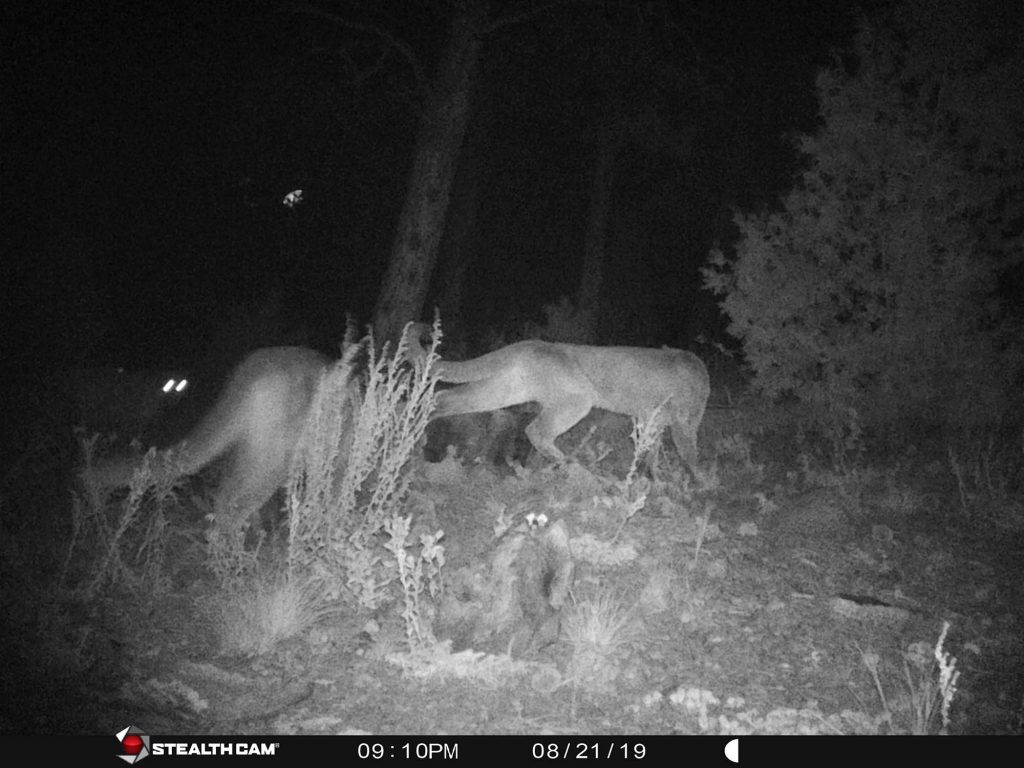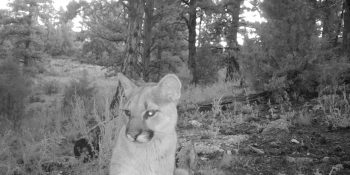BAILEY, Colo. – Two mountain lions were euthanized by USDA Wildlife Services Thursday following the killing (depredation) of a domestic goat in the Burland Ranchettes Subdivision. Per Colorado Parks and Wildlife policy, predators that depredate on livestock can be euthanized.
The two lions were seen by a homeowner after he realized one of his goats was missing. Responding CPW officers and federal Wildlife Services officials were already in the immediate area searching for the mountain lion responsible for attacking an eight-year-old boy the previous day.
Throughout the day Thursday, CPW wildlife officers received numerous reports of mountain lion sightings in the proximity of the search area that was taking place to look for the attacking lion.
Following Thursday’s search and removal of the two lions that had killed a domestic goat, CPW received reports of three more mountain lions on the same property. No additional goats had been reported as being predated upon as of Friday morning. CPW also received trail camera photos of multiple mountain lions the day of the attack in close proximity to the attack site. This is why Colorado Parks and Wildlife officials urge residents of the Burland Ranchettes Subdivision to remain vigilant.
“People need to take mitigating measures to protect their livestock, their pets and talk with their children on what they need to do if they happen to see a mountain lion,” said Area Wildlife Manager Mark Lamb. “We heard from many residents yesterday of the mountain lions that had been in the area, and the activity of them feeding heavily on deer, as mountain lions do. If you have deer hanging around your property, never feed them and we encourage you to haze them or other wildlife off of your property by yelling, blowing an air horn or whatever you need to do to make them go away.
“We don’t want people to panic, they are very aware of all the wildlife that lives around them, but the proper precautions need to be taken. There are obligations that people must be committed to for living responsibly with wildlife.”
Of the two mountain lions euthanized, both were sub-adult males, both around 65 pounds and in good body condition. An examination of the canine tooth length suggested an estimated age of 12 months. The stomach contents of these two mountain lions were full of goat tissue, and their intestinal and colon contents suggested they had been eating well prior to depredating on the goats.
DNA samples from these two mountain lions will be sent to the University of Wyoming Forensics Lab on Friday for testing to see if one of them matches DNA of the mountain lion involved in the attack on the child that occurred in the area on Wednesday night.
CPW wildlife officers do have one trap set at the attack site, but until DNA test results come back, there are no plans for actively searching for additional mountain lions with a dog team. If a mountain lion is caught in a trap, it will be held alive at a CPW facility while DNA samples are tested. If those come back negative, that mountain lion would be relocated.
Wildlife officers will continue to monitor lion activity in the Burland area. Officials do encourage residents to keep reporting mountain lion sightings or activity near their homes; they can do so by calling CPW’s Denver office at 303-291-7227 or calling Colorado State Patrol at 303-239-4501 after business hours.
With the continued increase in Colorado’s population numbers along with healthy wildlife populations it is the responsibility of all Coloradans and visitors to the state to help keep our wildlife wild. We all have a role to play in wildlife management and it is important for residents to play an active role in their neighborhoods and communities to reduce the likelihood of encounters.
To reduce the risk of problems with mountain lions on or near your property, CPW urges you to follow these simple precautions:
– Make lots of noise if you come and go during the times mountain lions are most active: dusk to dawn.
– Install outside lighting. Light areas where you walk so you could see a lion if one were present.
– Landscape or remove vegetation to eliminate hiding places for lions. Make it difficult for lions to approach unseen.
– Planting non-native shrubs and plants that deer often prefer to eat encourages wildlife to come onto your property. Predators follow prey. Don’t feed any wildlife!

– Keep your pet under control. Roaming pets are easy prey and can attract lions. Bring pets in at night. If you leave your pet outside, keep it in a kennel with a secure top. Don’t feed pets outside; this can attract raccoons and other animals that are eaten by lions. Store all garbage securely.
– Place livestock in enclosed sheds or barns at night. Close doors to all outbuildings since inquisitive lions may go inside for a look.
– Encourage your neighbors to follow these simple precautions. Prevention is far better than a possible lion confrontation.
SPREAD THE NEWS
COMMENT, Like, Follow & SHARE @I70Scout
CURRENT EDITION
WEATHER & TRAFFIC PUZZLES RECENT NEWS ADVERTISE WITH US

Leave a Reply